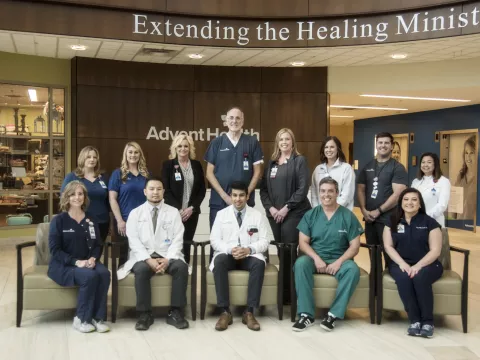- AdventHealth

Prostate cancer is rare in men younger than 40, but the chance of having prostate cancer rises after age 50. African American men and men with a family history of prostate cancer in close relatives are most at risk for developing this disease.

“Detecting prostate cancer early is extremely important,” said Hak Lee, MD, of AdventHealth Medical Group Urology at Calhoun. “When caught early, it is one of the most treatable cancers.”
Catching Prostate Cancer Early Can Save Your Life
While it primarily develops in older men, prostate cancer can happen at any age. In fact, it’s the second leading cause of cancer death among men. Although that’s a startling statistic, the good news is that most men diagnosed with prostate cancer, especially in its early stages, can survive it.
That’s why detecting this slow-growing cancer early, when it’s most treatable, is so important. A conversation with your primary care physician or urologist about your prostate cancer risk can help to create a screening plan that’s right for you.
Risk Factors and Screening Recommendations
“Prostate cancer usually doesn’t cause noticeable symptoms, especially in the early stages,” said Joanne Hooks, FNP-BC, at AdventHealth Medical Group Urology at Calhoun and Chatsworth. “Our primary care and urology team is incredible at providing personalized care for each and every patient.”
When no symptoms are present, we suggest starting prostate cancer screening at:
- Age 40 for men at high risk (family history of prostate cancer, especially father or brother or African Americans)
- Age 50 for men at average risk
Screening helps detect cancer before symptoms may occur, while the tests look for possible signs of prostate cancer but cannot tell for sure if you have cancer. If the screening test comes back abnormal, next steps should be taken — such as a prostate biopsy.
Prostate Cancer Screening Types
There are a number of tests that could be recommended to help your physician diagnose or rule out prostate cancer. No matter which screening you need, you can relax knowing that none of them are as bad as you think. Your primary care physician or a urologist may perform one or both of these relatively painless tests.
- Digital rectal exam (DRE): Allows your doctor to check your prostate for lumps (nodules) or anything unusual.
- Prostate-specific antigen test: Checks for an increased prostate-specific antigen (PSA) level, which could be a sign of prostate cancer but also could be elevated due to infection, inflammation or an enlarged prostate.
If prostate cancer is found, know that our care team at AdventHealth Gordon is here for you every step of the way. We utilize state-of-the-art equipment and offer the latest treatment such as specialized instruments built for biopsies of the prostate, the da Vinci Xi robotic surgical system, hormone therapy, chemotherapy, radiation and immunotherapy. Once diagnosed, our team helps patients with their individualized care from screenings, diagnosis and treatment to recovery. Our goal is to be by your side and deliver care in a supportive, compassionate environment from the beginning through your entire cancer care journey.
Feel Whole for Life
Learning more and talking to your doctor about prostate cancer will help you take charge of your health. If you’re in need of a primary care physician, visit GeorgiaPCPExperts.com.
Choose the health content that’s right for you, and get it delivered right in your inbox.
Recent News
AdventHealth Gordon is proud to announce its recognition as the #6 top small hospital in Georgia by Georgia Trend magazine. This prestigious ranking highlights AdventHealth Gordon's commitment to...
We are excited to share our December edition of Northwest Georgia Health News. This episode celebrates your work and commitment to delivering the best health care in our region by embodying our...
AdventHealth Gordon is hosting the AngioScreen bus from 8 am to 3 pm, Tuesday, Dec. 10. The AngioScreen bus will be parked in front of Resource Building 3 on the campus of AdventHealth Gordon. An...
This past weekend, AdventHealth Gordon hosted a free lung cancer screening at the AdventHealth Harris Radiation Therapy Center, offering uninsured patients a critical opportunity for early detection...
AdventHealth Gordon joins a premier group of organizations that have received Pathway to Excellence® designation from the American Nurses Credentialing Center (ANCC).
When Chatsworth resident Barry Gentry turned 60 in March, he had a new outlook on life to celebrate.
Did you know one out of eight men will be diagnosed with prostate cancer in their lifetime? The American Cancer Society (ACS) informs us that prostate cancer is the most common cancer aside from skin...
The Baby Place Welcomes Two New Members of its Team
AdventHealth’s $30 May Mammogram Campaign brought in a total of 1,068 residents for mammograms within AdventHealth’s Georgia market, 329 of which were part of the 30 promotion. The others were covered...
For Men’s Health Month, it is important to spread awareness for prostate cancer prevention and health screening education.
The AdventHealth Harris Radiation Therapy Center at AdventHealth Gordon has been designated a Lung Cancer Screening Center by the American College of Radiology® (ACR®).
Corazon, Inc., a national leader in services for cardiovascular care, has granted accreditation to the Percutaneous Coronary Intervention (PCI) program at AdventHealth Gordon.












